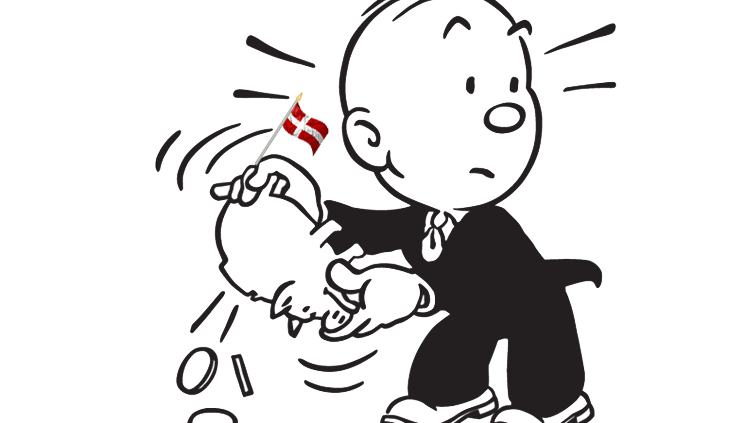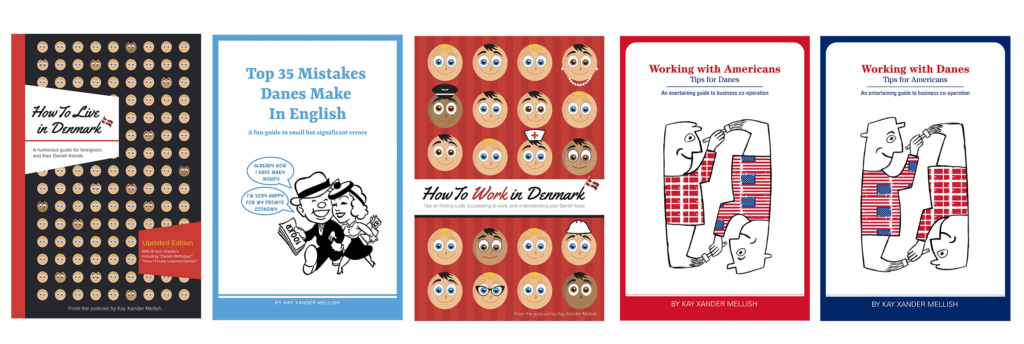Is joining a union worth the money? (And what’s the difference between a union and an A-kasse?)
When you first arrive in Denmark to work or look for work, the last thing you need is another monthly expense. So many foreigners “save money” by not joining a union.
And I was one of them. To be honest, joining a union never even occurred to me.
In the US, unions are either for hands-on workers – steelworkers, hotel maids – or for civil servants, like schoolteachers and cops. Knowledge workers and creative types are almost never unionized.
But that’s not true in Denmark, where engineers, doctors, lawyers, bankers, managers, and writers regularly join unions.
Unions can arguably be even more important for foreign employees than they are for Danes.
Access to people who know how things work in Denmark
First of all, when you join a union, you get access to their specialists. These people speak Danish, they know the Danish salary levels, and they know the Danish social welfare system.
So when you receive a contract from a Danish company, your union can go through the contract and make sure that you’re getting a fair deal when it comes to salary and benefits. They can look at vacation time, paternal leave benefits, arrangements for your spouse, whatever, and see if there are any red flags that you can negotiate away before you sign.
Danish employers expect this. They won’t be annoyed if you ask for a day or two to review the contract with your union. The person hiring you probably did this herself before she took her job. It’s completely normal.
When it all goes wrong on the job
Secondly, if things don’t go as expected on the job, the union can be your backup. When you have a dispute with your employer you can feel pretty vulnerable as a foreigner – especially if your residence permit depends on your job.
Your union can get involved, tell you what your rights are. Sometimes they’ll even take a meeting with you and your employer to get things sorted out.
And if you lose your job, which happens regularly to both Danes and foreigners, then you really need a union.
The famous “flexicurity” system in Denmark means it’s relatively easy to let go of people, particularly if they’ve worked at a company for less than a year. You can be laid off (or, as the Danes insist on saying, “fired”) without having done anything wrong: maybe the company is changing strategy, restructuring or simply having a bad year. And off you go.
They call you into a conference room
When you’re let go in Denmark – which has happened to me more than once – they call you into a conference room that generally only contains two people: one who tells you that you no longer have a job, plus one to serve as a witness.
And the first question they’ll ask you is “Are you a member of a union?” If you’re a union member, you’ll have the right to have a fourth person in the room, a union representative who is on your side. That person can make sure you get the best possible departure package.
I was not a member of a union the first time I got laid off, which was why I basically got whatever the company felt like giving me.
On a subsequent layoff, I was indeed a member, and was able to call on the union’s legal to team to decide if it was worth filing a lawsuit against my former employer. (It wasn’t.)
Which union should you join?
You’ll need to do a little research to find out which union suits you best. Some unions represent specific fields: IDA represents engineers, Pharmadanmark represents life science people, Kommunikation og Sprog is for media types, and Finansforbundet is for people who work for banks or in the finance industry.
The good thing about this type of union is that they know your industry well, and have a good overview of job prospects and new companies within the sector.
Industry-specific unions are generally non-political, and they also hold networking events where you can meet other people in your field, including people who work at companies that might be future employers. This is why it can sometimes be worth joining these unions even before your get to Denmark, or getting in contact as soon as you arrive.
Super-unions can help make sure you get paid
There are also unions that cover several fields, the so-called “super unions” like 3F, Dansk Metal and HK.
They can’t offer much industry-specific information, so I only recommend joining these if you work at a company that has a specific contract with them. For example, you might be doing student work as a restaurant server or hotel cleaner at a place that has deal with, for example, 3F.
Because there is no legal minimum wage in Denmark, the de facto minimum wage is whatever these unions negotiate with the employer group. So if your workplace has a deal with 3F, you get the minimum wage agreed on with 3F.
Your union will also help out if you get hurt on the job or if the employer decides not to pay you for some reason – something that happens regularly to vulnerable newcomers, if the Facebook groups catering to Foreigners in Denmark can be believed.
If you’ve got no union, you’ve got no backup. The Danish police don’t get involved with employee/employer disputes.
Check online ratings on discount unions
The big “super-unions” have been losing members over the past decade or so. Some people feel the monthly membership fees for these unions are too high; others don’t like the way these unions always seem to line up behind the same Danish political parties and policies.
Instead “yellow unions” are becoming more popular – cheaper, less political unions. (In Denmark, yellow is the color associated with discounts, while deep blue is associated with high-quality, high-cost products.) I sincerely can’t tell you how well these unions represent their members, although you can usually find online ratings. If their services to members aren’t good, a union isn’t worth joining.
The difference between a union and an A-kasse
It took me about a decade to figure out the difference between a Danish union and an A-kasse, so I hope I can make the process somewhat shorter for you.
A union, as I’ve explained above, gives you information about your industry and protects you on the job, standing in your corner if things go wrong. It also usually negotiates with business owners to set salary levels.
An A-kasse distributes your unemployment payments if you have a right to unemployment payments. That usually requires either EU citizenship or a permanent residency card.
In other words, if you’ve come to Denmark to work from India, China, Africa, the USA, Canada or any other non-EU area, you don’t need an A-kasse until you are granted permanent residency in Denmark. You can still benefit from a union, however.
If you have permanent residency or are from an EU country, you should sign up for an A-kasse as soon as you can.
What’s an A-kasse?
An A-kasse is a nonprofit organization that will pay out your dagpenge, or unemployment insurance, if you lose your job. It will also usually pay out your sygedagpenge if you’re temporarily too sick to work.
The truth is, the money they distribute comes from the Danish government, and you’ll get the same amount no matter which A-kasse you choose. The A-kasse is just the administrator, which is why you should choose an A-kasse with good online reviews for its administrative ability.
Your A-kasse will also do various things to try to muscle you back into the workplace, like helping you write your cv and repeatedly directing you towards job openings. (The Danes have the unsubtle strategy of making unemployment so unpleasant that it’s easier to work.)
Skipping an A-kasse is a stupid way to save money
You pay for your A-kasse on a quarterly basis, but it’s deductible from your giant Danish taxes, so it doesn’t really cost that much.
Skipping an A-kasse is a stupid way to save money: as broke as I occasionally get, I still keep paying for my A-kasse, though I’ve never actually needed to use it.
That’s because if you don’t have an A-kasse and become unemployed or sick, you won’t be able to get dagpenge. Without dagpenge, there’s nothing on offer except the dreaded kontanthjælp, the payment Denmark offers to the poorest of the poor.
Although the rules change constantly, you’re generally not allowed to own anything of value if you accept kontanthjælp, which means selling your home, your vehicles, and even your jewellery in some cases. And if you have a partner, you may not be eligible for kontanthjælp – the state considers it your partner’s job to support you.
It’s all very ugly and unpleasant, which is why I suggest signing up for an A-kasse as soon as you’re eligible. You usually have to be a member for a year before getting any benefits, so sign up when you still have a job.
You can price-shop among A-kasse – here’s a Danish-language site with an up-to-date list of A-kasse prices – but make sure to do some research on their service levels before just going for the cheapest option.
Make them work for you
Once you have a union, an A-kasse, or both, don’t just lean back and send them money without taking advantages of the services they offer, like networking, free courses and career counselling.
And don’t be afraid to switch if you find a better deal. The different unions and A-kasse are very competitive with each other, and they’re constantly coming up with various short-term deals to lure you away from their rivals.
I recently switched myself, after someone from a branch of Ledernes, the manager’s union, called up and offered me 24 months’ free intægtssikring. This “income insurance” (also known as lønsikring) is a popular product that makes up the often substantial difference between your actual salary and dagpenge if you lose your job.
Talk to your friends and your colleagues about the unions and A-kasse they use. If they’ve got a better one, go ahead and trade up.
There’s surprisingly little paperwork involved, and your new A-kasse or union will generally take care of it for you. You’ll usually get a sad phone call from the organization you left behind, but other than that it’s an easy, painless process.
[icon name=”facebook-square” class=”fa-3x”] [icon name=”twitter-square” class=”fa-3x”]
Hear all our How to Live in Denmark podcasts on Spotify and on Apple Podcasts (iTunes).
[icon name=”facebook-square” class=”fa-3x”] [icon name=”twitter-square” class=”fa-3x”][icon name=”instagram” class=”fa-3x”]
Buy Kay’s books about Denmark on Amazon, Saxo, Google Books, Apple Books, Barnes & Noble Nook, or via our webshop.
Image mashup copyright Kay Xander Mellish [current_year]
Read more:
Decoding your Danish pay slip and understanding your Danish taxes
How to handle a Danish business meeting
What to wear to work in Denmark: Quiet colors, quality cut and fabric
Your first day at work in Denmark: Handshakes, passwords, and several people named Mette
Trailing spouses and working in Denmark
Motivating Danish employers: Tips for foreign managers
Networking in Denmark: 5 useful tips for making Danish business contacts
Secrets of socializing with your Danish colleagues
The Danish art of taking time off
Your free daily banana and five weeks off: Job benefits in Denmark
Why job titles aren’t that important in Denmark
The Danish job interview
Job search in Denmark: Your Danish cover letter plus LinkedIn plus two magic words
Job hunting in Denmark: Putting together your Danish CV
Fine-tuning your approach to the Danish job market
Finding a job in Denmark: Some tips from my experience
Will I ever be promoted? Plus, how to leverage your annual review
Taking sick days in Denmark, plus how to deal with stress









Hi Kay. Thanks for this informative and helpful post. I’m from the US and an married to a German. I don’t have permanent residency yet (it keeps getting postponed my the current government) but I pay into an a-kasse. I was surprised to read your advice that Americans without permanent residency should not join an a-kasse. Presumably this holds only if one’s residency permit is tied to their job? In other words they’d have to leave Denmark if they lost the job; therefore, a-kasse payments aren’t worth it. Is that correct?
Hi Sarah! I should have clarified that “A-kasse only with permanent residency” only applies to the workers themselves, not to trailing spouses. Ironically, trailing spouses ARE eligible for dagpenge even if the working spouse is not. The spouses can join an A-kasse…but may find the A-kasse is not very excited about seeing them. This is because A-kasse make their money via government incentive payments for getting Danish citizens/permanent residents into jobs, but don’t get paid for getting employment for spouses.
Hi Kay – Thanks. I am actually a working accompanying spouse. It took me some time to get a job, but I joined an a-kasse as soon as I started. I just wanted to make sure that I hadn’t misunderstood something – that unless you are from the EU/EEA countries or have permanent residency, you shouldn’t join an a-kasse. I am in neither group but it DOES make sense for me because I am married to an EU citizen so I wouldn’t be kicked out of the country if I lost my job. This might be worth mentioning. I know a lot of spouses of Danes here, too, in a similar situation…
I don’t think it just applies to accompanying spouses, either. I am a non-EU citizen and have a residence permit connected to my job (a fixed time contract with a start and end date) that extends to 6 months beyond the end of the job contract. During this 6-month “jobsøgningsperiode” (job-seeking period) I cannot work unless I get a new residence permit that allows work, but I can receive dagpenge (I double checked this with SIRI about six weeks ago). So I would say that any non-EU citizen with a “jobsøgningsperiode” at the end of their residence permit should become an A-kasse member if they have any plans to stay in Denmark to look for more work following their employment period.
Ian,
That’s a perilous situation to be in, isn’t it? I mean, what if you can’t get a job within this 6-month period? I suppose you’d have to leave the country?
Hi Kay,
I’m a little surprised that A-kasser disapprove of spouses joining them. I mean, the spouse on a temporary residence permit who works and pays their taxes would be no different than one with permanent residency. So, I don’t see why A-kasser should disapprove if the former want to join one and contribute to it.
Hi Nigel
The difference is the government subsidy. The A-kasser don’t get paid that subsidy for finding work for spouses. If the Danish government were to change that rule, I’m sure the A-kasser would be more happy to assist spouses.
Hi Kay – Thanks for this informative piece. I’m a member of a union here in the US (Professional Engineers in California Government) but it sounds as if Danish unions do a heck of a lot more for their members than American unions (or at least mine). The portion on having the union help negotiate salary caught my attention. California state employees have a set pay based on classification vs the private sector which negotiates salary. The union negotiates with the State salary increases in bulk rather than individually. Because of this, one question that came to mind as I was reading: if I am job hunting for an engineering position in Denmark from here in the US and a Danish company is interested in hiring me, and it comes time to negotiate salary, should I join a union at that point for assistance in negotiating salary? If not, at what point should I join?
I have tried to get a sense of what Mechanical Engineers in Denmark make, but I haven’t been able to have much luck since all of the websites that gauge salaries based on positions are mostly US or English language oriented. So far, the best I’ve seen is that a Mechanical Engineer with roughly 10 years of experience earns approximately the equivalent $72,000 USD per year. Does that sound about right?
Thanks!
That sounds about right, although you must remember to factor in Danish taxes and price levels. Rent in particular varies widely based on where you live in Denmark. If you are serious about moving to Denmark, I recommend that you join the engineer’s union as soon as possible, for access to their networking and perhaps to job openings. There are also several websites that focus on jobs in English in Denmark – Google that with your search term and you may find the most up-to-date ones.